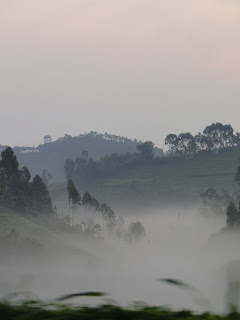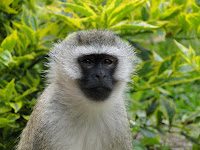
I used to have a t-shirt that said “where's the beef,” based off of the Wendy’s slogan. Thank goodness I became a vegetarian years ago because there’s no beef to be shown around these woods, and therefore I had very little, if any difficulty adjusting to the vegetarian diet in the Village. Inspired by many friends and family members inquiring about the food in Rwanda, I decided to keep a food journal for one week in order to exemplify my diet while here. After being here for nearly 3 months, I have found that there are only 2 foods I cannot stand eating. I tried both of them, and one I will tolerate if I am really hungry (Japanese BITTER eggplant, which was actually just served at lunch), but the other I just absolutely refuse to eat (cassava bread, which is not bread at all, but can be depicted as a lump of disgustingness). To bluntly describe it, cassava bread has the consistency of homemade play-do, minus the taste, with an added bonus – it smells like rotting feet. It really is that disgusting.
Now that I have discussed what I do not eat, it is time to enter into the world of what I do eat. Welcome to my world of food in Rwanda:
NOTE: If you are contemplating moving to the Village for a year and you don’t like beans and/or rice and/or repetition, this is probably not the best fit for you :)
Day 1:
- Breakfast – an American “dinner roll” and porridge. The porridge is similar to cream of wheat, but a bit grainier, and it gives off the smell of burnt toast. Honestly, I really like it.
- Lunch – cooked bananas, “salad” (green beans, coleslaw, cucumber), white rice, bean and carrot stew
- Dinner – white potatoes with scallions and garlic, white rice, cassava greens and bean stew
Day 2:
- Breakfast – an American “dinner roll” and African Tea (known as Chai in the Western world).
- Lunch –sweet potatoes with chives, hard boiled eggs, white rice, carrot and pea stew
- Dinner –cooked bananas, white rice, sauerkraut stew
Day 3:
- Breakfast – an American “dinner roll” and porridge.
- Lunch – white potatoes, “salad,” white rice, eggplant/green bean/peanut sauce stew
- Dinner – sweet potatoes , white rice, bean and cauliflower stew
Day 4:
- Breakfast – an American “dinner roll” and porridge.
- Lunch –cooked bananas, white rice, carrot and squash stew
- Dinner –white “Irish” potatoes, white rice, bean and carrot stew
Day 5:
- Breakfast – an American “dinner roll” and porridge.
- Lunch –fried sweet potatoes (yummy!), white rice, cassava greens stew
- Dinner –cooked bananas, white rice, bean stew
Day 6:
- Breakfast – an American “dinner roll” and porridge.
- Lunch – white “Irish” potatoes, green beans, white rice, bean and sauerkraut stew,
- Dinner –cooked bananas, white rice, eggplant stew
Day 7:
- Breakfast – an American “dinner roll” and porridge.
- Lunch – cassava bread, white rice, bean stew
- Dinner – sweet potatoes, white rice, carrot stew
It would be unfair to lead you to believe that I eat every meal in the dining hall. Breakfast begins at 6:15am and is far too early for me most days, so I generally opt to make oatmeal in my room, porridge in my kitchen, eat a maize cake from the local market, or have a honey and peanut butter sandwich on homemade challah, which I try to bake each week in the Village kitchen. (see photo to the left) 
Just for your reference, breakfast is at 6:15am M-F, 7am S-S. Lunch is at 2pm M-F, 1pm S-S. Dinner is at 8pm M-F, 7pm S-S.
Even though snacks are not part of Rwandan culture, I am American and can not quite kick the habit. Some of my favorites include (aside from the snacks I brought from America):- Freshly roasted peanuts (see photo below of me roasting them myself!)
- Tea biscuits with peanut butter
- Maize cake (similar to corn bread) either plain, with peanut butter and/or with honey
- Butterscotch candies
- Amandazi (Rwandan fried dough) - plain, with peanut butter and/or with honey
- Chapatti (Rwandan pita) – yes, with peanut butter, or plain
- Mango
- Pineapple
- Sambussas – thin pastry shell filled with potatoes and spice (see photo below)

- Avocado (with two brother’s seasoning from my mom’s grocery store)
- Chocolate yogurt lollipops
- A spoonful of peanut butter…my addiction hasn’t stopped just because I moved to Africa
- Ice cream - believe it or not, there is only 1 store in all of Rwanda that makes its own ice cream - it is called Inzozi Nziza (Sweet Dreams) and is located in Butare. When I stopped there, I indulged in pineapple ice cream with fresh passion fruit topping...YUMMY!
Although many foods that I could or would buy in America are available here, a) there isn’t much variety to choose from (ie. Skippy peanut butter is the only American brand of peanut butter available) and b) imported products are EXTREMELY expensive (ie. Skippy peanut butter is $25 for a jar, cereal is over $10 a box, etc.). Some items that are disappointingly difficult or impossible to find are:
- Dried fruit (although I just found raisins!)
- Chocolate chips
- Trail mix
- Mixed nuts, or anything besides peanuts
- A REAL salad, made with lettuce, not cabbage
- Sweet corn
- Mushrooms
Acquiring food is just different here. If I want to cook something myself, I either have to negotiate a fair price (as soon as a white person approaches a local vendor, the price instantly doubles) at a local market (see two market photos to the left), 















